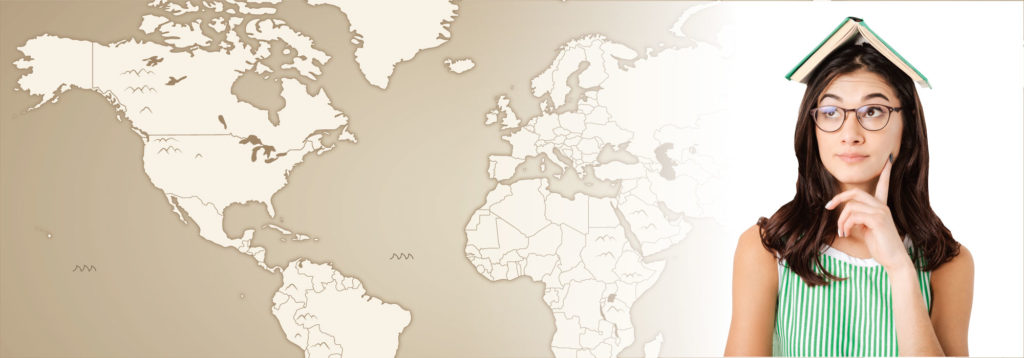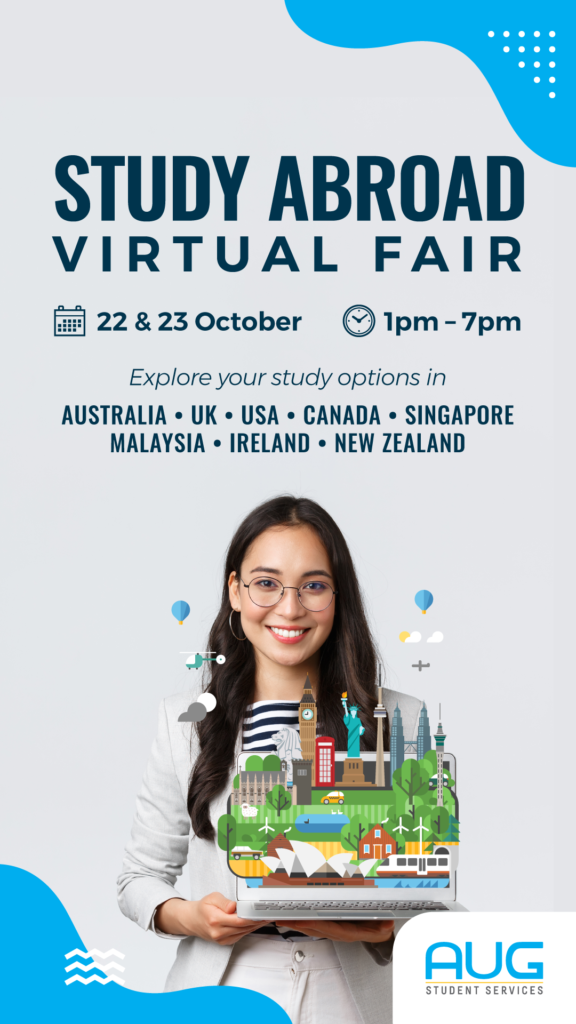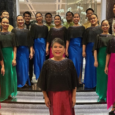Written by: Joven Peña III
The desolation brought by the COVID-19 pandemic is evidently present not just in the economy, but predominantly in education. Numerous schools were forced to shut down operations due to a lack of contingency plans, as well as a lack of resources and equipment to provide remote learning whereas the institutions that were able to adapt and deliver hybrid learning formats are still thriving to do so.
Although these abrupt maneuvers required students to adjust to the timely way of learning, many of them (especially senior high school students) are surprisingly still willing to explore their study options not just locally, but also internationally. Since the peak of the outbreak, most of the countries remain closed for international students to study onshore, while some are still open and partially re-opening to deliver face-to-face classes.
International institutions were also severely affected by sudden lockdowns, but delivering online classes is not new to them since most already have existing online or cloud campuses before – pertinent to international time zones. As the COVID-19 cases continue to increase, hybrid delivery will likely dawdle for an uncertain amount of time, leaving questions about the students’ study experience left and right.
Study Abroad Startups
Fortunately, I was able to connect with few students who have been caught by lockdowns before flying to their study destinations and currently taking online classes. One of them, Andrea Salvador, is taking a Bachelor of Arts in Psychology and Linguistics at the University of Melbourne.
“I always knew I wanted to study abroad even from the beginning of high school but I don’t know which country to consider,” she says, “until I ended up joining this competition which is the Trinity College Young Leaders program where I submitted an essay and later found out that I was granted with a 1-week scholarship to attend the program. Eventually, I learned how they conduct studies there in Australia and that made me decide to study abroad. I also found out that I can already start a Foundation Program with Trinity after finishing Grade 11 here in the Philippines, so it’s like a win-win for me.”
Nonetheless, another student, Kianna Palacios, expressed that her exposure to international education only emerged upon entering her senior year. “I always had the idea of studying abroad but it’s just sitting at the back of my head until I decided maybe I should put attention to that idea,” she says, “I guess it’s sort of late, but luckily, I was able to get accepted in a matter of time.”
Choosing a Course and an Institution
Selecting which school and which course you are going to apply to is one of the toughest and major decisions a student can encounter. Although some already have a deep-rooted passion since their juvenile years, some are still stuck in the exploring stage.
Asking Andrea about it, she gave me a small laugh and said that choosing her program is something she has already savvied since high school. “I always knew I wanted to take Bachelor of Arts because my skills in reading and writing are way better than math and science,” she says, “I picked psychology as one of my majors since I took a psychology subject during my foundation year which by the way I did better than expected, then linguistics because it really caught my interest.”
When I asked Kiana the same question, she gave me quite the opposite reaction but the same in terms of distaste toward numbers (They do and same here!). She’s currently taking a Bachelor of Social Science in International Relations at Macquarie University.
“I actually don’t know which course I am going to take at first, then my mom talked about her friend who studied international relations and now working at the United Nations. So, I checked the program and found out that the subjects I will take are something that I did relatively well in high school,” she says between small laughs, “Honestly, I’m not that good in science and math subjects so I just stuck with that program eventually.”
In terms of university selections, Andrea is pretty straightforward about her response. “Since I studied in Trinity, I did expect me to study at the University of Melbourne right after. The idea of transferring to other universities doesn’t work for me. Besides, I love how flexible UniMelb is when it comes to, you know,” she pauses, “Like I was able to take the majors I was interested in, and also given the fact that they are currently the #1 university in Australia this year.”
But for Kiana, it’s kind of a different process. “I honestly wouldn’t have even known about Macquarie if it weren’t for AUG. Other than that, I mostly picked it because of the scholarship, since Macquarie gives off a 10,000 AUD per year for students coming from ASEAN countries (ASEAN scholarship),” she says, “I also picked them because my dad knows a lot of people who have worked with in the past that have graduated from Macquarie who are very successful now!”
Online Class Setup
Since “a day in my life” is notoriously trendy these days, I was also able to ask them what is the usual day or schedule of an international student taking online classes. Laughing it off, Kiana says, “Honestly in general, it’s pretty much different compared to my friends’ classes here in the Philippines. First is that I don’t have a lot of classes in a day or in a week, and each of my subjects has both a tutorial and a lecture. The tutorial is a live discussion via Zoom [or any other meeting platform], then the lectures are pre-recorded,” she says, “and the subjects would depend on schedule and availability, some of them may overlap, but I can always go back to a lecture since it’s pre-recorded. That’s what I love about my daily schedule, it’s pretty flexible.”
Andrea agreed to the suppleness of the class schedules, and she also pitched the time zone apprehensions. “I guess I’m lucky because that’s one of my concerns if I was able to fly in Australia,” she says, “But same as online, you know. The time difference is not that wide, and we get to choose the time of classes we want to attend to like I always choose the afternoon ones so I don’t have to wake up early. I guess online classes also really require discipline since the lectures are pre-recorded, and your study habits will be tested. That’s why I’m more into the live tutorials where I get to interact with my instructors and classmates.”
Joining Social Clubs
In a tertiary setup (pre-coronavirus era), social activities are also imperative whereas joining student clubs and organizations are required or encouraged. “I actually have a lot of commitments outside academics,” Kiana reveals. “I can say that Australian institutions are very good at providing student-engagement activities. Like there’s a lot of clubs, orgs, and events that students can join to, from orientations, open days, and many more,” she says, “But I guess it’s up to the students if they want to make the most out of it.”
Words for Aspiring Students
Although the pandemic certainly caught them off-guard, particularly their study plans, Andrea and Kiana seem to be conformed with their current setup. When I asked them how did the pandemic change their outlook on studying abroad, Andrea points out, “As I’ve said earlier, this what I wanted since high school. Even if I study here in the Philippines, it’s still online, and although I’m not there physically in Melbourne, after all, it’s the learning that really matters.”
While Kianna indicates, “At first, I thought that early 2020 I can already fly down under but nothing has ever changed since then, like the borders are still closed. But knowing the difference between the online classes here in the Philippines and Australia, I’ve pretty much just stuck to Macquarie. It’s an international education at home.”
Furthermore, before I ended my session with them, I got the chance to ask them to give a few words to those students who are interested to study abroad, and both of them unexpectedly have mutual sentiments. Andrea takes the first answer with enthusiasm, “I think this is the best time for the students to explore their study options abroad. Since everything now is accessible online, you can attend virtual events. Unlike before, you have to be onshore for you to attend these kinds of things,” she says, “I suggest for those who wish to study abroad universities are very open to inform students, try to attend free online workshops, masterclasses, and info sessions to widen your idea about international education.”
With a huge smile, Kiana says, “Yes, explore your options as early as now. For me I suggest this one; always prioritize which course you are going to take, and maybe list some pros and cons and just sort it out. Because here in the Philippines, upon university entry, you are still going to study subjects that are not related to your degree at all, but for my case in Macquarie, we get straight ahead with the major components of the degree,” she adds, “If you think you are capable, just go for it.”
Online Class Now, Campus Life Later
There are some differences between the views of these two students, that’s for sure. However, as expected, learning remains integral. Whether you might be studying online or on campus, after all, you are still acquiring the quality education offered by international institutions. As everything is still under the umbrella of uncertainty, virtual accessibility is a great opportunity for students to expand their study horizons. As mentioned, a lot of international institutions are currently offering free virtual activities that students can join in. From one-on-one consultation, open days, campus tours, masterclasses, workshops, student competitions, info sessions, and many more.
In the light of this pandemic, AUG, the one who helped Kiana and Andrea on their study abroad journeys, remains to provide assistance and guidance to students who aspire to venture into international education. AUG is a one-stop student services center and a non-profit organization funded by their partner universities from Australia, UK, the US, Singapore, Malaysia, Canada, New Zealand, and Ireland. They represent hundreds of institutions and help students from applications up to student visa processing. Their services are free of charge.
Interested to be like Andrea and Kiana? Every year, AUG organizes a Study Abroad Fair wherein they gather representatives of their partner institutions for them to personally talk to students who have plans of studying overseas. Their goal is to let the students be more informed and be exposed to the possibilities of studying abroad with the best services at hand.
In this virtual event, you can:
– Check available scholarships
– Avail of a free consultation with our experienced counselors
– Waive your application fees
– Have fun and win prizes
Save the date – October 22 and 23, 2021 – and register now!







